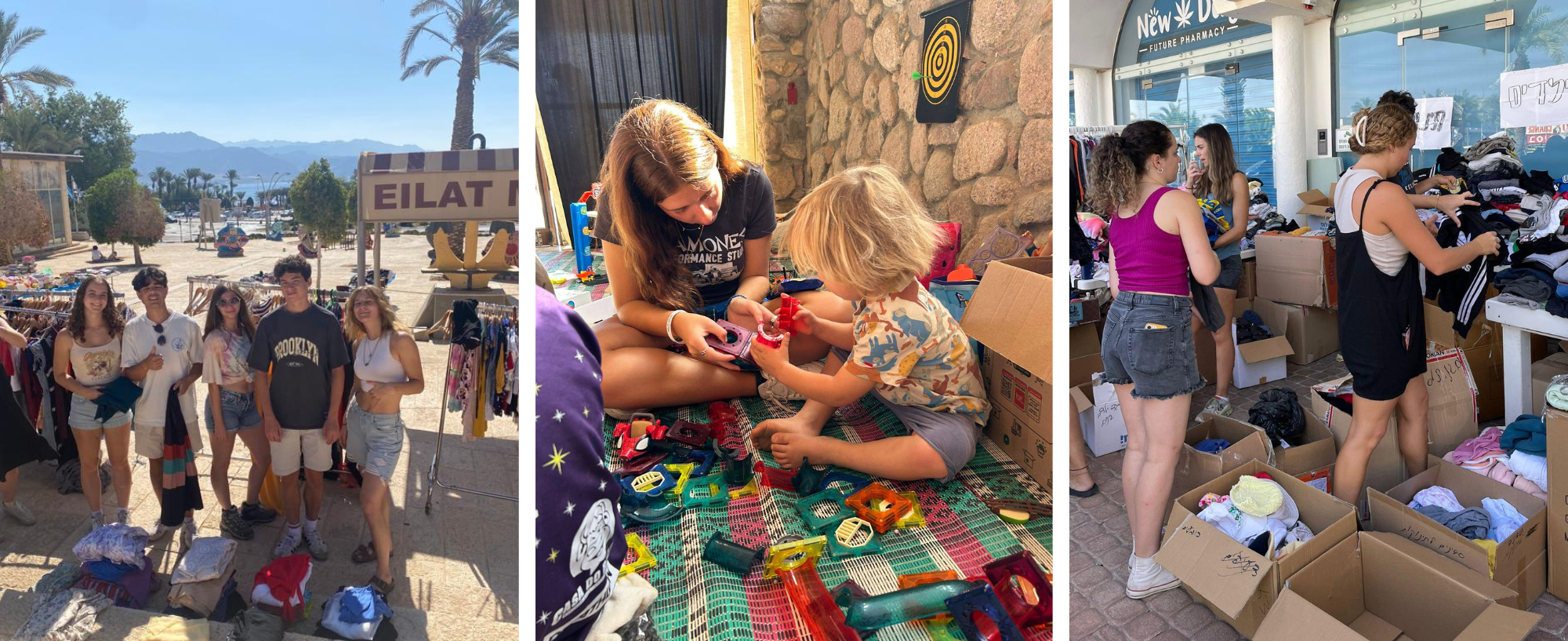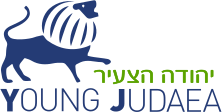
How Year Course Brought Light to Israel’s Darkest Days
By Rabbi Adam Drucker, Director of Education
Immediately after October 7th, before war tourism and volunteer groups began to arrive, a group of 70 gap year students from Young Judaea Year Course chose to stay in Israel. Given the choice to continue their gap year during a time of complete distress and confusion for the country, or to leave and make new plans, this group felt compelled to help Israel’s most vulnerable populations and step up in a time of need.
Directly after the attacks, the Year Course group was moved to the Young Judaea founded Kibbutz Ketura to ensure their safety. While on the Kibbutz, participants began volunteering throughout the area.
In the early days after October 7th, government ministries were not functioning and the responsibility to care for those directly impacted was left to local municipalities and volunteer groups. Once the Year Course cohort had arrived in the south, the staff began to establish links with the local representatives and leaders of these groups to ascertain what was needed. With most of the Israel’s work force above the age of 18 called up to the IDF, the resource of 70 able bodied and energetic gap year students spread among the local leadership in Eilat and the Arava.
It was these groups who Year Course would work with in the first six weeks of the war, volunteering to help displaced families, farmers, soldiers, and all those affected by the attacks.
Participants reflected on those days following the attacks and shared their thoughts on what it meant to contribute in those early days.
Several participants helped cared for displaced children from the Gaza Envelope communities, while their parents took the time to cope with their trauma, and plan for their future. Maya Kaye’s (Fresno, CA) and Zoe Alon (Fort Lauderdale, FL) helped evacuees by running dance classes and other extra-curricular activities. Maya recalled, “By engaging with displaced children from the Gaza Envelope, I found a sense of belonging and purpose,” and Zoe added, “I wanted a sense of connection to the people I was helping.” Maya went on to share how her decision to stay and help was driven by a belief in the importance of solidarity and compassion in fostering resilience and healing. By offering moments of joy and distraction, they sought to provide comfort and support during a challenging time.
Some Year Coursers spent time working in distribution centers in Eilat, helping displaced families who had lost everything from the attacks. Klara Walny (Northbrook, IL) remembers, “The main volunteering body (18-40 year olds) had been called up from reserves and were on the front line fighting which is why I needed to be there. These families came into the distribution sites distressed and with few belongings, and with my limited Hebrew, a smile, and a willingness to help, the families left calmer and in a better state of mind. I see no reason not to roll up my sleeves and keep going. I am here for a reason.” Her commitment stemmed from a desire to alleviate suffering and contribute to the community, evident in her efforts to provide essential assistance to those in need.
Reflecting on their experiences six months later, participants’ motivations varied but shared a common thread of compassion and a desire to make a tangible difference during a time when Israelis were abandoned by Israeli governmental institutions. Rafi Nagorsky (Chicago, IL) felt it was his duty to step up, “It was definitely clear that since most of the rest of the country was occupied with other things, if we weren’t volunteering it’s possible that no one else would.”
Many of the participants were so deeply impacted by this moment of solidarity and selflessness, that as of today, nine have enlisted to serve in the IDF. Sophie Gilbert (Woodmere, NY), is one of those students who felt the war sparked something in her, “There was something about the war which made me realize not only do I want, but I that need to be an agent of change in my country.”
The Young Judaea Year Course students found a deep sense of fulfilment in their roles, whether it was providing practical assistance, fostering connections with displaced families, or simply offering moments of joy to Israelis during hardship. Through their collective efforts, they discovered a newfound sense of purpose and solidarity, reaffirming their commitment to Israel, Zionism, the values of Tikkun Olam.
Although there is still much darkness in a post October 7th Israel, Year Course participants who’ve remained in the country have become small, yet bright lights of hope, shaping countless lives and empowered by the desire to give of themselves.Immediately after October 7th, before war tourism and volunteer groups began to arrive, a group of 70 gap year students from Young Judaea Year Course chose to stay in Israel. Given the choice to continue their gap year during a time of complete distress and confusion for the country, or to leave and make new plans, this group felt compelled to help Israel’s most vulnerable populations and step up in a time of need.
Directly after the attacks, the Year Course group was moved to the Young Judaea founded Kibbutz Ketura to ensure their safety. While on the Kibbutz, participants began volunteering throughout the area.
In the early days after October 7th, government ministries were not functioning and the responsibility to care for those directly impacted was left to local municipalities and volunteer groups. Once the Year Course cohort had arrived in the south, the staff began to establish links with the local representatives and leaders of these groups to ascertain what was needed. With most of the Israel’s work force above the age of 18 called up to the IDF, the resource of 70 able bodied and energetic gap year students spread among the local leadership in Eilat and the Arava.
It was these groups who Year Course would work with in the first six weeks of the war, volunteering to help displaced families, farmers, soldiers, and all those affected by the attacks.
Participants reflected on those days following the attacks and shared their thoughts on what it meant to contribute in those early days.
Several participants helped cared for displaced children from the Gaza Envelope communities, while their parents took the time to cope with their trauma, and plan for their future. Maya Kaye’s (Fresno, CA) and Zoe Alon (Fort Lauderdale, FL) helped evacuees by running dance classes and other extra-curricular activities. Maya recalled, “By engaging with displaced children from the Gaza Envelope, I found a sense of belonging and purpose,” and Zoe added, “I wanted a sense of connection to the people I was helping.” Maya went on to share how her decision to stay and help was driven by a belief in the importance of solidarity and compassion in fostering resilience and healing. By offering moments of joy and distraction, they sought to provide comfort and support during a challenging time.
Some Year Coursers spent time working in distribution centers in Eilat, helping displaced families who had lost everything from the attacks. Klara Walny (Northbrook, IL) remembers, “The main volunteering body (18-40 year olds) had been called up from reserves and were on the front line fighting which is why I needed to be there. These families came into the distribution sites distressed and with few belongings, and with my limited Hebrew, a smile, and a willingness to help, the families left calmer and in a better state of mind. I see no reason not to roll up my sleeves and keep going. I am here for a reason.” Her commitment stemmed from a desire to alleviate suffering and contribute to the community, evident in her efforts to provide essential assistance to those in need.
Reflecting on their experiences six months later, participants’ motivations varied but shared a common thread of compassion and a desire to make a tangible difference during a time when Israelis were abandoned by Israeli governmental institutions. Rafi Nagorsky (Chicago, IL) felt it was his duty to step up, “It was definitely clear that since most of the rest of the country was occupied with other things, if we weren’t volunteering it’s possible that no one else would.”
Many of the participants were so deeply impacted by this moment of solidarity and selflessness, that as of today, nine have enlisted to serve in the IDF. Sophie Gilbert (Woodmere, NY), is one of those students who felt the war sparked something in her, “There was something about the war which made me realize not only do I want, but I that need to be an agent of change in my country.”
The Young Judaea Year Course students found a deep sense of fulfilment in their roles, whether it was providing practical assistance, fostering connections with displaced families, or simply offering moments of joy to Israelis during hardship. Through their collective efforts, they discovered a newfound sense of purpose and solidarity, reaffirming their commitment to Israel, Zionism, the values of Tikkun Olam.
Although there is still much darkness in a post October 7th Israel, Year Course participants who’ve remained in the country have become small, yet bright lights of hope, shaping countless lives and empowered by the desire to give of themselves.
